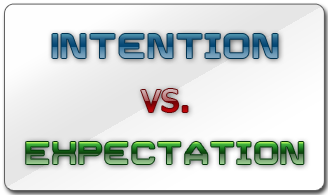 Many businesses find themselves making decisions based on expected outcomes. It makes sense on the surface, you look at a decision or idea, try to determine an outcome, then go forward based on what you expect to happen. This is a passive way to approach any situation however, and may lead to missed opportunities, even loss of control of the direction of your business to a degree. Instead think about intentions. What do you want to do, not what you expect the outcome to be. This leaves you and your business in a better position to change as needed while heading toward a goal because you’ve taken away the expectation of the decisions you’ve made.
Many businesses find themselves making decisions based on expected outcomes. It makes sense on the surface, you look at a decision or idea, try to determine an outcome, then go forward based on what you expect to happen. This is a passive way to approach any situation however, and may lead to missed opportunities, even loss of control of the direction of your business to a degree. Instead think about intentions. What do you want to do, not what you expect the outcome to be. This leaves you and your business in a better position to change as needed while heading toward a goal because you’ve taken away the expectation of the decisions you’ve made.
Seems a bit vague so let’s give an example of a locksmith with the expectation that they would increase their business with a website redesign if, as part of the redesign, they focused on the most profitable services. We cover this example in an earlier entry.
So the expectation was that by refocusing on more valuable services their base customer numbers would stay the same (actually hopefully increase since they were doing more marketing but let’s go easy on them) but profit would increase because these expensive services came first. Long story short, that’s not what happened at all. Business decreased because it turned out some of the less profitable services are what brought customers in, and those customers would come back for the more profitable (and less common) services some other time if it was a good experience. They lost those potential customers to competitors. Those customers didn’t come back for the more profitable service, they went to the place that made a simple duplicate key instead, or whatever the case may have been. Seems like an easy fix (and it is) until you factor in the power of expectation. The locksmith had a preconceived notion of how the site would work. It’s hard to let that go. It’s easy to blame the drop in business on other things because there was an expectation. Had the focus been on the intent however, it takes the ego and the disappointment out of the equation. It almost makes changing an expected part of the process—which it should be.


